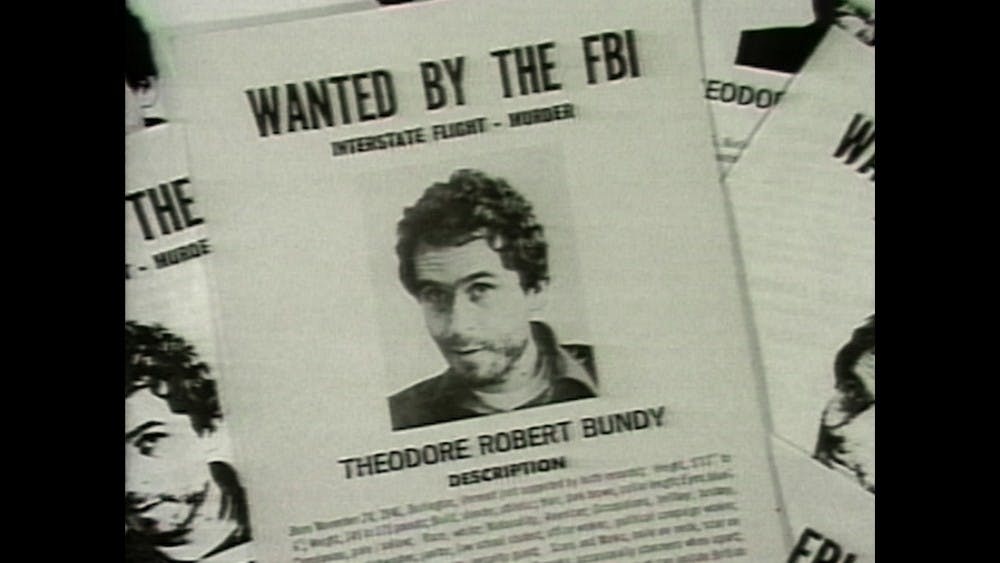He’s been dubbed the "Jack the Ripper" of the United States. He’s admitted to brutally violating and murdering over 30 women during the 1970s. He’s known for his disarming charisma and (literally) devilish good looks. His story has been recounted in media and popular culture countless times. Ted Bundy—the household name that plagued headlines and haunted millions for decades—is emerging once again. 30 years after his execution, we’re offered yet another allegedly unique look into the mind of America’s most infamous serial killer—this time, through a Netflix Original.
Released on Jan. 24, Conversations with a Killer: The Ted Bundy Tapes consists of four hour–long episodes that cover Bundy’s life, from early childhood to the day he died. True crime legend Joe Berlinger created and directed the series that is meant to offer Bundy’s own perspective on the defining events of his own life. The episodes include previously unreleased audio of interviews between Bundy and journalist Stephen Michaud, who conversed with Bundy during his incarceration.
For a large part of the interviews conducted between Bundy and Michaud, Bundy insisted his innocence and refused to speak on the murders for which he was arrested. It’s not until Michaud figured he could trick Bundy, who had a degree in psychology, into speaking of himself in the third person that Bundy began to talk a little more candidly. But even speaking in third person, Bundy's dialogue still consisted of veiled and removed descriptions of the crimes, lots of vague psycho–babble, and straight up lies. In short, the tapes are not the new take they advertise themselves to be.
The hype for this series comes from its promise to reveal the true inner workings of Bundy’s mind—to finally hear, from the man himself, what made him tick and why he did what he did. This series does everything but that. Their rehash of Bundy's life is not only disappointing, but kind of boring.
The series sought to offer a nuanced and personal view of Bundy while maintaining a scare–factor comparable to that of the killer himself. But it wasn’t scary or surprising. Bundy's crimes are common knowledge, and any true crime fanatic already knows the details of Bundy’s personal life, which are uncreatively regurgitated throughout all four episodes.
The series’ few strengths, however, make it something at least worth watching. The first of these is footage of Bundy’s trials and the public’s reaction to his eventual execution. A former law student, Bundy represented himself in court and relied heavily on charm and wit to maintain his innocence. He cross–examined witnesses solely to relive the gruesome details of his crimes. He even proposed to his future wife, Carol Anne Boone, while she gave her testimony on the stand. The trials were bizarre to say the least, but they were more revealing of his character than any of the tapes mentioned in the series’ title. On the day of his eventual execution, shocking footage displayed crowds of people who showed up to watch Bundy’s execution like it was the Super Bowl. They drank, barbecued, and sold T–shirts and pins with phrases like “Burn, Bundy, Burn” and “It’s Fryday, Ted."

Another part of the series guaranteed to make your heart drop is the moving story of Bundy survivor Carol DaRonch and her escape from his terrifying clutches as just a teenager. This series gave meaningful screen time to those brutalized by Bundy and was sensitive to his real–life victims. It doesn’t romanticize Bundy or dilute the atrocities that have debilitated so many. Unfortunately he’s been depicted in this manner before and potentially will be again, as can be seen in the punchy, almost comic trailer for Extremely Wicked, Shockingly Evil, and Vile, a Bundy biopic starring Zac Efron.
This docuseries, while it maintains a very important sensitivity, ultimately falls flat as it doesn’t manage to induce goosebumps or include any jaw–dropping revelations. If anything, it’s a disappointing reminder that Bundy is, in fact, not special at all. Enabled by 70s era police technology and a veil of "conventionality" (read: He was white and could read a book), Bundy got away with a lot. Even when he was found guilty, he was treated with a level of respect that a black or brown defendant of the same or lesser chargers could only dream of.
The judge who served him his first death penalty, Edward Cowart, had some unconventional parting words for the convicted killer:
“Take care of yourself, young man. I say that to you sincerely; take care of yourself. It is an utter tragedy for this court to see such a total waste of humanity, I think, as I’ve experienced in this courtroom. You’re a bright young man. You’d have made a good lawyer and I would have loved to have you practice in front of me, but you went another way, partner. I don’t feel any animosity toward you. I want you to know that.”
The Ted Bundy Tapes is not revolutionary, and, in essence, neither was Ted. He was just a horrible man who committed horrible crimes, full of cowardice and hatred. And in today's world, where violence is unfortunately all around us, his story feels all too familiar.







